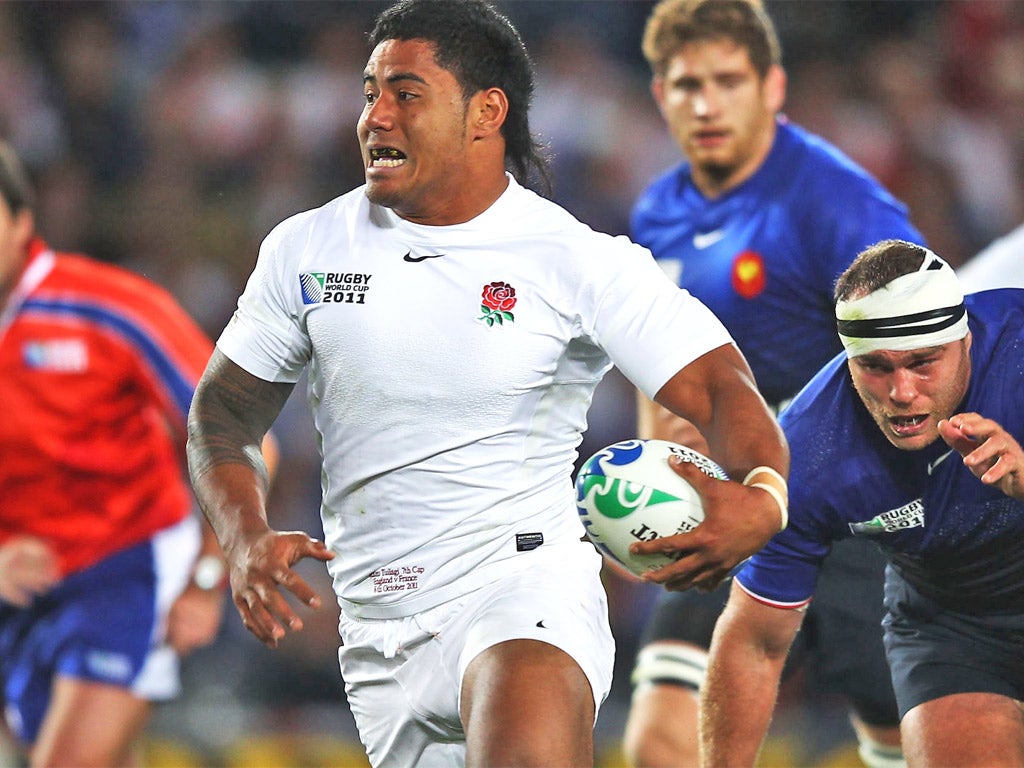Leicester 'cut wages of Tuilagi brothers while at World Cup'
England and Samoa players suffer 'ludicrous' practice that threatens integrity of 2015 event

Your support helps us to tell the story
From reproductive rights to climate change to Big Tech, The Independent is on the ground when the story is developing. Whether it's investigating the financials of Elon Musk's pro-Trump PAC or producing our latest documentary, 'The A Word', which shines a light on the American women fighting for reproductive rights, we know how important it is to parse out the facts from the messaging.
At such a critical moment in US history, we need reporters on the ground. Your donation allows us to keep sending journalists to speak to both sides of the story.
The Independent is trusted by Americans across the entire political spectrum. And unlike many other quality news outlets, we choose not to lock Americans out of our reporting and analysis with paywalls. We believe quality journalism should be available to everyone, paid for by those who can afford it.
Your support makes all the difference.England's Manu Tuilagi and his brother, the Samoa international Alesana, both had their wages cut in half by Leicester during last year's World Cup, according to their agent.
Freddie Tuilagi, who also used to play for Samoa and now represents his brothers, claims the two had 50 per cent of their wages docked for the time they spent playing for their countries in New Zealand.
While England players are well paid in recompense, it is a gap that a financially struggling union like Samoa cannot make up and it represents another example of the pressures that are exerted on Pacific Island players to choose club over country.
Freddie Tuilagi and Damian Hopley, chairman of the International Rugby Players' Association, both called on the International Rugby Board to act to prevent wage docking and protect the integrity of the 2015 World Cup. The Independent revealed yesterday how the Pacific Island nations face the likelihood of having to field weakened teams in the tournament as a result of pressure European clubs are putting on their players.
"Guys are always proud to play for their country but this can't go on," said Freddie Tuilagi. "If the IRB want to make sure the best players will turn up to the World Cup, they need to find a solution to make sure the best players aren't out of pocket."
Tuilagi's claim suggests that Leicester, despite being reimbursed by the RFU for their England players on international duty, are penalising players. A Leicester spokesman would only say: "All our contracts are confidential."
Hopley described wage docking as both "common practice" and "ludicrous", adding that it would be suicide for a player to act as a whistle-blower. He said: "We have been aware that wage-docking has been common practice in some clubs for a number of years and have raised it consistently at the appropriate levels only to be told that this is a personal consideration and decision executed through an individual's contract.
"While there is some understanding that clubs need to maintain strong squads during international windows, it does seem ludicrous that players are penalised financially for reaching the pinnacle of international sport.
"This is an ongoing matter that we are taking up with the national and international governing bodies and, from a player's perspective, it seems incongruous that the clubs are being compensated by the RFU for access to their England internationals and are then penalising those very same players when they are playing for their country. How can this be fair in any employment contract? While the IRB maintain they are looking into this, they are requesting evidence by sight of players' contracts to stop this wage-docking practice. Players will never come forth to whistle blow on their employees, it is commercial suicide.
"The National Unions – who are the IRB members – are fully aware that this is a common practice and must report it accordingly. Players are left with Hobson's choice as to sign the contract or leave the club."
The IRB's regulation nine forbids clubs from offering any form of disincentive, either through "contract or conduct", to players not to represent their country. Hopley said : "This has to be seen as a disincentive and it goes right to the heart of IRB regulation nine."
Yesterday the French Rugby Union acknowledged it had received a complaint from Fiji against Racing Métro regarding the withdrawal of Jone Qovu from their current touring party due to injury. Qovu pulled out of the Fiji squad – who face England at Twickenham on Saturday – late last month, but went on to play for his club against Perpignan in the Top 14. Racing have also been accused by a former coach of the club of offering three Fiji players financial inducements to miss the 2011 World Cup. The club deny having done so.
The IRB, accused of failing to enforce regulation nine, released a statement yesterday which said: "We continue to pro-actively work with Unions on the release of players selected for international duty during IRB windows under regulation nine." The RFU declined to comment last night.
Join our commenting forum
Join thought-provoking conversations, follow other Independent readers and see their replies
Comments